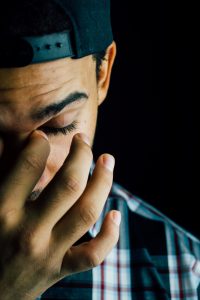If you find yourself reading this article, chances are that you or someone you love has been expressing symptoms of depression or mania. Like a pendulum, those who suffer from manic depression experience dramatic mood swings between incredible highs and devastating lows.
 More appropriately referred to as bipolar disorder, this can be an incredibly difficult and stunting emotional experience that can hinder one’s emotional progress. For many, manic depression feels like being stuck on a boat with no rudder and a massive sail. Wherever the wind blows, that’s where you go.
More appropriately referred to as bipolar disorder, this can be an incredibly difficult and stunting emotional experience that can hinder one’s emotional progress. For many, manic depression feels like being stuck on a boat with no rudder and a massive sail. Wherever the wind blows, that’s where you go.
Sometimes there’s a storm and you move incredibly fast, while at other times no wind exists at all, and you feel stuck and aimless. The good news, however, is that bipolar disorder is treatable, and many can thrive through healthy management of their symptoms.
Before we get into what bipolar disorder/manic depression is, I would like to address what it is not. Quite often, a client in my office will speculate that someone around them is bipolar. When this is the case, they quite often report someone with high emotional reactivity around whom they feel they must walk on eggshells.
Usually, I suspect that this might revolve around a personality disorder, not bipolar or manic depression. Some personality disorders, such as borderline personality disorder, involve high emotional reactivity that oscillates throughout a day. Someone dealing with Borderline Personality Disorder might go through phases where they relate to you in a way that goes something like this:
 “I love you.”
“I love you.”
Then 20 minutes later: “I wish you would die.”
Then 20 minutes later still “I’m so sorry, please come back, I love you so much.”
And on and on this cycle can go. The cyclical nature of this often leads people to believe that this is bipolar disorder or manic depression. However, the colloquial use of bipolar isn’t quite accurate when it comes to actual diagnoses of bipolar disorder. Bipolar disorder (of which there are types I and II) consists of oscillating between mood states of depression and mania, which usually last weeks at a time.
The Depression Cycle
For the depression cycle of bipolar disorder, this usually looks like a decrease in mood and/or a lack of pleasure in most anything. Depression is often reduced to simply a sad mood; however, it involves much more.
A major depressive episode consists of one of the above symptoms, as well as a mix of thoughts about death, anxiety, physical symptoms, a feeling of slowing down, fatigue, difficulty thinking, sleep issues, and difficulty managing all these symptoms. Further, all of this would be in the absence of a drug or alcohol which might bring these on.
For those suffering from bipolar disorders, depression cycles can be brief periods of weeks/months at a time. Depression for someone with bipolar disorder does not look significantly different from someone suffering from major depressive disorder, it’s just that they then rotate into a manic cycle as well. Quite often, the depression hits after a manic cycle that has resulted in significant consequences for the individual. So, let’s look, then, at what constitutes mania.
The Manic Cycle
Mania as defined by the DSM-5 consists of “a distinct period of abnormally and persistently elevated, expansive, or irritable mood and abnormally and persistently increased goal-directed activity or energy” (APA, p 124). This period often results in individuals feeling and believing that they could do anything.
However, there exists some variability in this. Bipolar, as previously mentioned, is classified as type I and type II. Type one is the “larger” mania. At this point, individuals might engage in risky scenarios or even develop “psychotic” features.
 This means someone who is actively hallucinating or having delusions of grandeur; something like believing you are the King of the United States or on the run from the CIA. Mania often feels good for those experiencing it, like an upper drug like cocaine. For this reason, often those struggling with substance abuse have a tough time teasing out if it is the result of the drug or bipolar disorder.
This means someone who is actively hallucinating or having delusions of grandeur; something like believing you are the King of the United States or on the run from the CIA. Mania often feels good for those experiencing it, like an upper drug like cocaine. For this reason, often those struggling with substance abuse have a tough time teasing out if it is the result of the drug or bipolar disorder.
There is also type II mania, which is a lesser experience. There is still an elevated mood state, but it is usually less severe and less long-lasting. They might need little sleep but not necessarily stay up all night. Often those who experience Bipolar II will not have as low of lows either. One of the hallmark differences between I and II is that in I there exits more specific goal-focused energy, whereas II involves just general high motivation.
Regardless of Type I or II, the comedown after mania often involves shame and guilt over what has been done. Often in a manic state, an individual might spend more than they have or engage with multiple sexual partners, garnering the risks that might come with that. After this period many feel bad and this triggers the subsequent depressive cycle, and on and on it goes.
How to Address Manic Depression
The good news, however, is that there are a variety of ways to help with manic depression/bipolar disorder. My first recommendation would be to talk to a primary care doctor and get a referral to a psychiatrist or psychiatric nurse practitioner. Mania is best helped by taking and maintaining a regime of medication, usually in the vein of mood stabilizers.
Mood stabilizers do exactly what it sounds like: stabilize your mood, but from ups and downs. Antidepressants are often avoided because they could trigger a manic state. However, many who deal with bipolar feel they enjoy the effects of mania so there is often the temptation to go off their medication, so it is important to maintain good social supports.
 Primary support for someone going through bipolar disorder would be a therapist or counselor. Psychiatrists often only see clients once a month at the most, so having someone to weekly check-in on you can help with medication compliance and navigating life stressors that could trigger mania or depression.
Primary support for someone going through bipolar disorder would be a therapist or counselor. Psychiatrists often only see clients once a month at the most, so having someone to weekly check-in on you can help with medication compliance and navigating life stressors that could trigger mania or depression.
Especially when in depressed states, counselors can help you to find a new balance and process your emotions to get out of a less deep state. Further, if in a full manic state counselors will have the eyes on you to potentially call for hospitalization if needed to protect your safety. A combination of medication and counseling is considered the gold standard treatment for most mental health issues.
Finally, working with a counselor should involve empowering you to find social support from friends and family. They will have the most eyes on you and can encourage you in either your depressed or manic states. Both depression and mania are easier to help in the initial stages before they gain momentum, so having those in your life who can call it out are incredibly helpful.
Further, a counselor can work with you to identify what sorts of copings skills might work for you to maintain your mood in either a high or a low, and then you can relay this to your family to help remind you of what works.
Manic depression/bipolar type disorders affect 2.4 percent of the population. While that seems small, chances are you know at least a couple of people that struggle with this or will struggle. So much stigma exists around bipolar disorder that those working through it must seek out help and guidance.
To go back to our original analogy, if having bipolar feels like a boat without a rudder, treatment is like give you an outboard motor to give you both direction and power to control where you go. Don’t delay if you feel like this is you or a loved one and reach out soon to a doctor and a therapist.
“Sailboat”, Courtesy of Oliver Sjöström, Pexels.com, CC0 License; “Darkness of Depression”, Courtesy of Pixabay, Pexels.com, CC0 License; “Counseling Session”, Courtesy of Cottonbro, Pexels.com, CC0 License; “Wake”, Courtesy of Maahid Photos, Pexels.com, CC0 License


